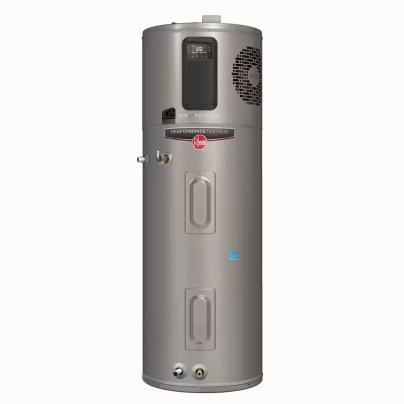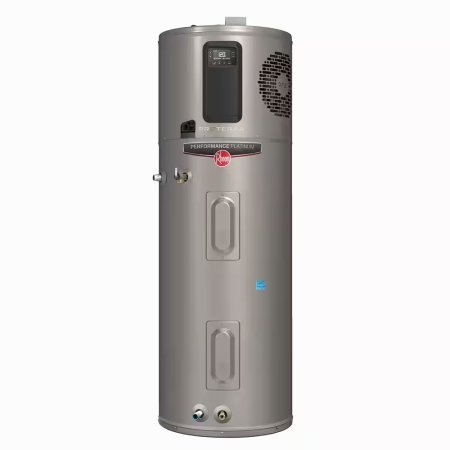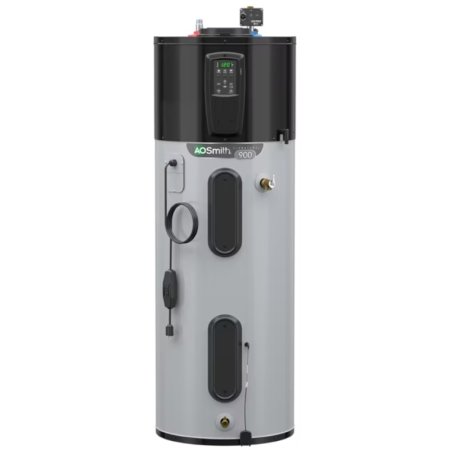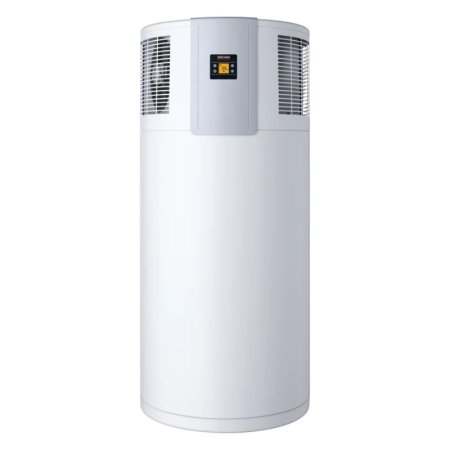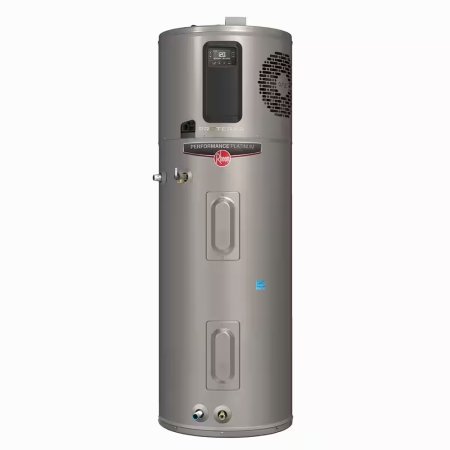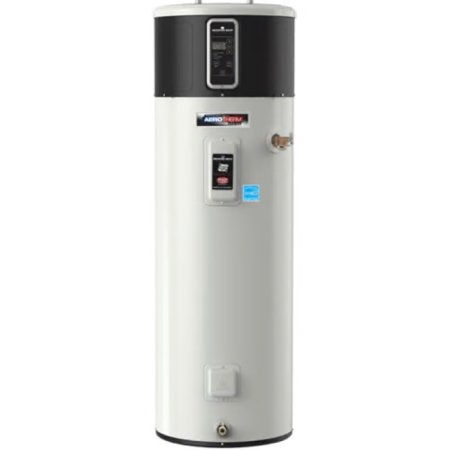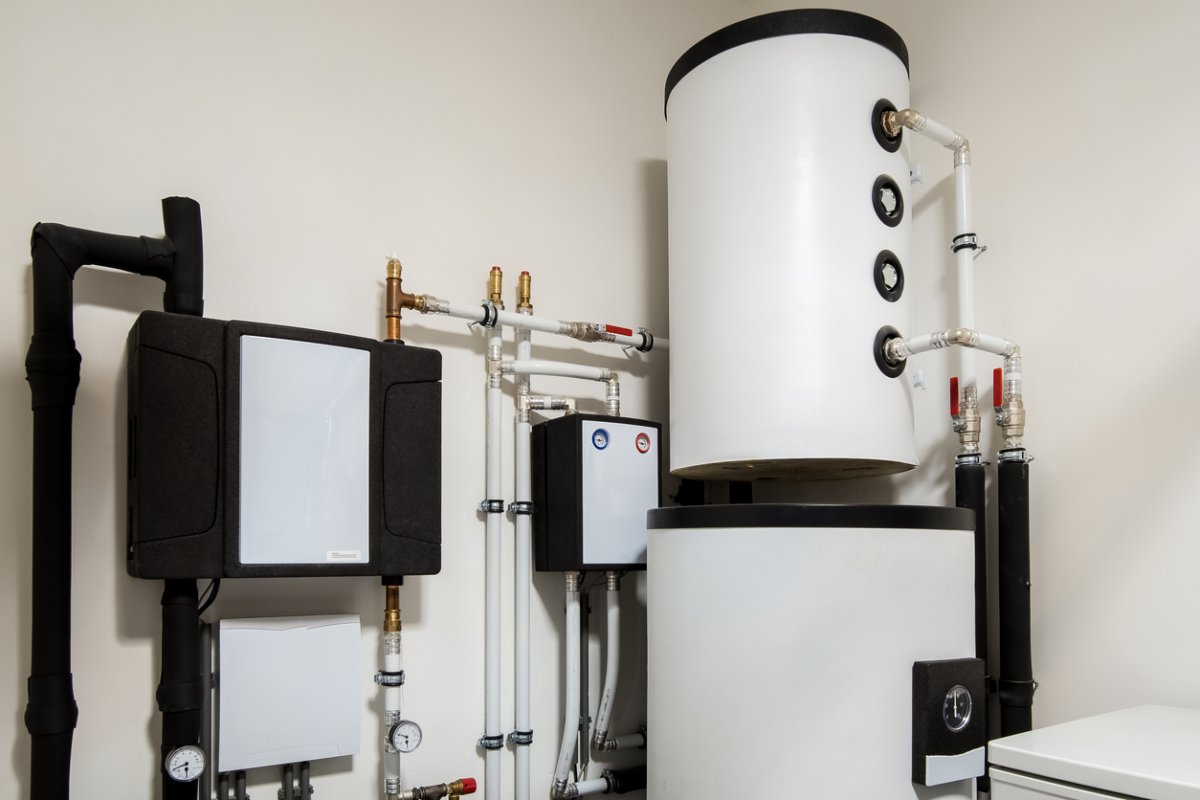
We may earn revenue from the products available on this page and participate in affiliate programs. Learn More ›
Heat pump water heaters are widely recognized as the most efficient way to produce hot water for the home. They use less energy than traditional water heaters—and that means significantly lower utility bills. It also means fewer greenhouse gases, so they’re better for the planet.
So why don’t we all have one? In part, it could be that consumers don’t have enough information and are unsure of how to choose the right model. A higher initial cost might also be a factor. This guide explains how heat pump water heaters work—and how they save money—and explores all the key features. It also reveals our picks for the best heat pump water heaters currently available today.
- BEST OVERALL: Rheem Performance Platinum Hybrid Water Heater
- BEST BANG FOR THE BUCK: A.O. Smith Hybrid Electric Heat Pump Water Heater
- UPGRADE PICK: Stiebel Eltron Accelera 220 E Heat Pump Water Heater
- BEST SMART: Rheem Performance Platinum Smart Water Heater
- MOST VERSATILE: Bradford White Aerotherm Heat Pump Water Heater
- BEST FOR COOLER REGIONS: Eco2 Systems Sanco2 Heat Pump Water Heater
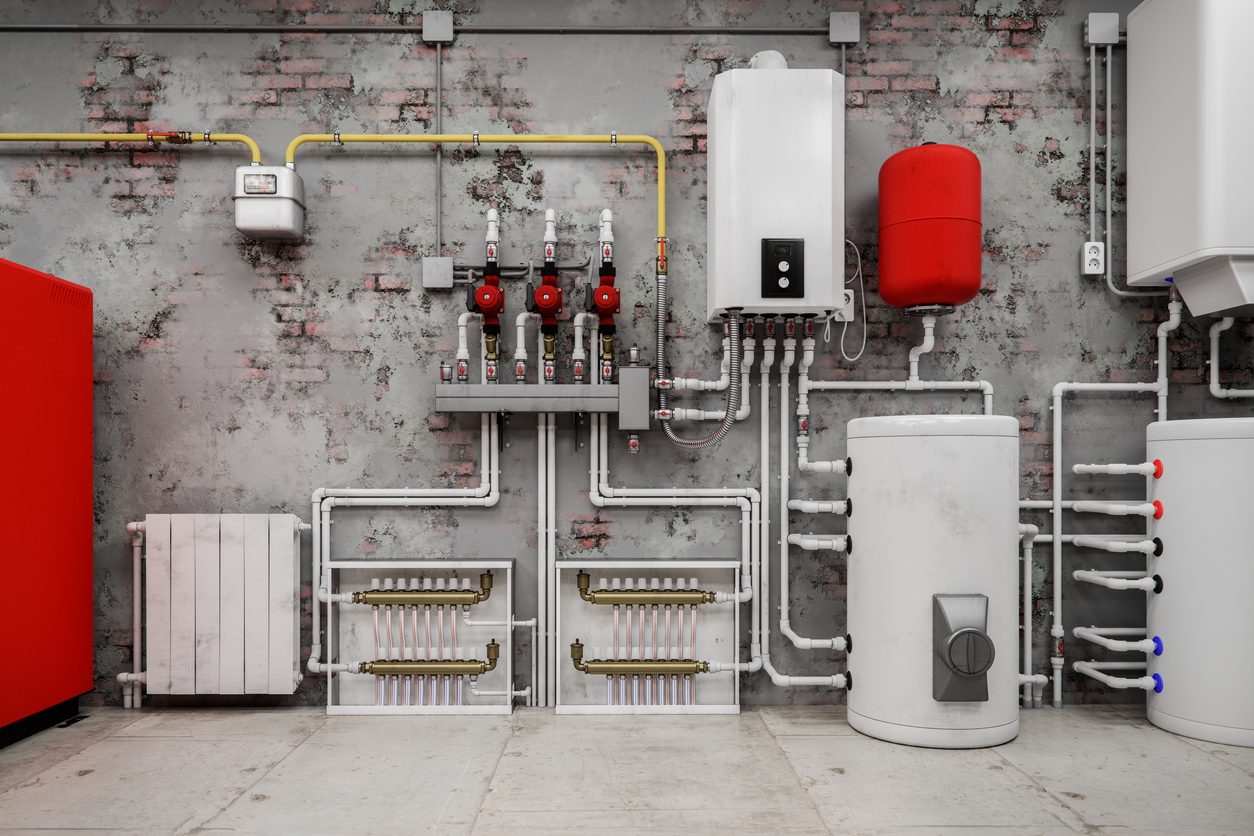
Before You Buy a Heat Pump Water Heater
Despite their efficiency and economy, heat pump water heaters may not be for everyone. While significant savings occur over time, a heat pump water heater cost will initially be more than most alternatives. Additionally, some models don’t heat water quite as quickly as traditional gas or electric models. Busy families will want to look carefully at both tank size and first hour rating, which is the estimate of how many gallons of hot water a water heater can provide in an hour when starting with a tank full of hot water.
Some heat pump water heaters also need ample air space from which to draw heat. Keith Wortsmith, president of Dash Heating, Cooling & Plumbing in Hot Springs, Arkansas, confirms this: “Heat pump water heaters require sufficient airflow around them to function efficiently. This often means they can’t be installed in tight spaces like a small closet.” However, a hybrid heat pump water heater can be an effective solution. Wortsmith agrees, noting, “This type of heat pump water heater has a great advantage. It can switch to a traditional electric water heater when required.” This flexibility can overcome the issues of cold environments and restricted spaces.
Tankless water heaters are an economical alternative, so we looked into whether a tankless heat pump water heater had been developed. Unfortunately, we only located one option, and it’s currently only available for commercial installation.
How We Chose the Best Heat Pump Water Heaters
A handful of brands dominate this market, which meant we could conduct detailed research on just about every model currently available: nearly two dozen models in total.
There are three distinct types of heat pump water heaters, so it was important that we found leading examples of each type for this guide. Key factors in deciding which models rose to the top were capacity (including if multiple sizes were available to suit different needs), heating efficiency, energy savings, and cost. We also analyzed customer feedback from several retail sources so we could check real-world reliability and durability.
Our Top Picks
The following selections offer a variety of different solutions in specific categories. Read on to learn more about our top picks for the best heat pump water heaters on the market today.
Best Overall
Rheem Performance Platinum Hybrid Water Heater
Pros
- Hybrid model with 5 operating modes, including rapid heating for high-demand periods
- Estimated energy savings of up to $3,150 over 10 years, plus potential rebates
- Wi-Fi capability and EcoNet app allow extensive monitoring and control from anywhere
Cons
- Although most appear reliable, some customers have noted heat pump issues
Product Specs
- First hour rating: 67 gallons
- Uniform energy factor: 3.88
- Other sizes (in gallons): 40, 65, 80
One criticism of heat pump water heaters is that they can be slow. The Rheem Performance Platinum water heater negates this concern with a hybrid setup that can operate in either heat pump mode for maximum energy savings or standard electric mode that produces hot water rapidly. Thanks to Wi-Fi integration and the EcoNet app, users can adjust these settings from anywhere.
It’s even possible to see how much hot water is in the tank via the app.
The important first hour rating (FHR) is a competitive 67 gallons. According to Rheem, this model’s uniform energy factor (UEF) of 3.88 means potential energy savings of 75 percent compared to standard electric water heaters. That percentage translates to a savings of up to $315 per year.
Get the Rheem hybrid heat pump water heater at The Home Depot.
Best Bang For The Buck
A.O. Smith Hybrid Electric Heat Pump Water Heater
Pros
- Offers a good balance between competitive performance and value for money
- Hybrid technology allows easy switching between maximum economy or fast heating
- Among the quietest water heaters on the market at just 45 decibels
Cons
- Problems aren’t common, but some owners experienced difficulties with warranty claims
Product Specs
- First hour rating: 65 gallons
- Uniform energy factor: 3.8
- Other sizes (in gallons): 66, 80
A.O. Smith’s hybrid heat pump water heater is another model that uses hybrid technology to produce hot water very quickly to satisfy high demand but run economically the rest of the time. According to the manufacturer, this technology can result in potential energy savings of 76 percent compared to standard electric models—up to $385 per year.
This model’s specifications are similar to many competitors with an FHR of 65 gallons and a UEF of 3.8. The iCOMM Smart Connectivity app allows monitoring and control from a smartphone, and users can also receive an alert if a leak is detected. The Leak Shield system will then automatically shut off the water supply until the leak is fixed. The pricing of the A.O. Smith Signature is a bit higher than our best overall pick, but all things considered, we think it offers excellent value for money.
Get the A. O. Smith heat pump water heater at Lowe’s.
Upgrade Pick
Stiebel Eltron Accelera 220 E Heat Pump Water Heater
Pros
- German-engineered construction offers superior reliability
- Rated to save up to 80 percent on hot water costs
- Booster element provides additional hot water at times of peak demand
- Super-insulated tank promises to keep water hot over 2-week vacations for just $4
Cons
- No Wi-Fi connectivity or smartphone app
- Louder than some competitors at 60 decibels
Product Specs
- First hour rating: 50.3 gallons
- Uniform energy factor: 3.09
- Other sizes (in gallons): 80
Stiebel Eltron is keen to point out that its Accelera 220 E model is not a hybrid product but a full heat pump water heater. This manufacturer’s focus has been on energy savings, and it claims that this model reduces hot water bills by as much as 80 percent. Super insulation keeps water hot for longer periods, while redesigned air intake and exhaust allow for installation in compact spaces.
An FHR of 50.3 gallons reflects the fact that this is a pure heat pump model, leaving no doubt they are a little slower. However, there is a booster option for periods of high demand. The UEF is 3.09. A digital display on the unit shows hot water volume, but the lack of Wi-Fi connectivity and a smartphone app for remote monitoring are definite downsides to this model.
Find a Stiebel Eltron heat pump water heater retailer at Stiebel Eltron.
Best Smart
Rheem Performance Platinum Smart Water Heater
Pros
- EcoNet app offers multiple control functions and monitoring home or away
- LeakSense system shuts off water supply with an audible alarm and notification via smartphone app
Cons
- Typically costs more than the Rheem Performance Platinum hybrid model, with some customers noting the advantages are minimal
Product Specs
- First hour rating: 67 gallons
- Uniform energy factor: 3.88
- Other sizes (in gallons): 40, 65, 80
The Rheem Performance Platinum smart water heater is based on our top pick—the Rheem Performance Platinum hybrid model—and shares impressive figures of an FHR of 67 gallons and a UEF of 3.88. This model also offers a multifunction screen on the unit itself and an EcoNet smartphone app that offers control over mode selection.
The main benefit of this Rheem water heater is the LeakSense leak detection system that will automatically shut off the water supply if a leak is detected and limit water loss to a maximum of 20 ounces. Additionally, an audible alarm will sound, and the unit sends a notification to the user’s smartphone app. So, if the user is away, they don’t need to rush home to address the leak.
Get the Rheem smart heat pump water heater at The Home Depot.
Most Versatile
Bradford White Aerotherm Heat Pump Water Heater
Pros
- Offers a level of personalization that no other heat pump water heater we researched could match
- Adjustable mode settings can provide even greater energy savings than government UEF figures
- 2-inch non-CFC foam insulation minimizes heat loss
Cons
- No automatic leak shutoff feature
- Significantly more expensive than competitor models
Product Specs
- First hour rating: 65 gallons
- Uniform energy factor: 3.44
- Other sizes (in gallons): 65, 80
The Bradford White Aerotherm heat pump water heater is another hybrid model, and like many competitors, it offers multiple operating modes. However, the level of control available to the user on this water heater is exceptional. Whereas many rivals switch to the electric mode for rapid water heating, this model’s standard mode combines both heating systems, making it both fast and economical. The published UEF of 3.44 is calculated in standard mode, so even greater savings are possible when using the unit as a heat pump only.
Full electric mode is available for very cold days. Vacation mode will allow the water temperature to drop but automatically boost it to the normal user-defined level the day before return, so there’s no wait for hot water. The Bradford White Connect app allows the user to create schedules and adjust temperatures remotely.
Get the Bradford White heat pump water heater at Amazon.
Best For Cooler Regions
Eco2 Systems Sanco2 Heat Pump Water Heater
Pros
- Will produce hot water when air temperatures are as low as -25 degrees Fahrenheit
- Outdoor unit can be as far as 50 feet from indoor tank, allowing for flexible installation
- Low power consumption makes it ideal for combining with solar panels
Cons
- No Wi-Fi connectivity
- High-priced option for basic functionality
Product Specs
- First hour rating: 69 gallons
- Uniform energy factor: 3.11
- Other sizes (in gallons): 83, 119
The Sanco2 heat pump water heater is a two-part system that uses technology similar to split air conditioning units. The heat pump stays outdoors, with a hot water tank inside instead of a fan. These systems are particularly ideal for cooler climates, as they continue to produce hot water even when the outside temperature is as low as -25 degrees Fahrenheit. They can be fast as well, with this 43-gallon model delivering an impressive FHR of 69 gallons.
The outdoor unit runs at a near-silent 37 decibels and can be placed up to 50 feet from the indoor tank. Since the tank’s job is to simply contain hot water, it is suitable for installation in restricted spaces. However, while the Sanco2 heat pump water heater is very efficient, its functionality is fairly basic with no modes or smartphone app.
Find a Eco2 Systems heat pump water heater retailer at Eco2.
Jump to Our Top Picks
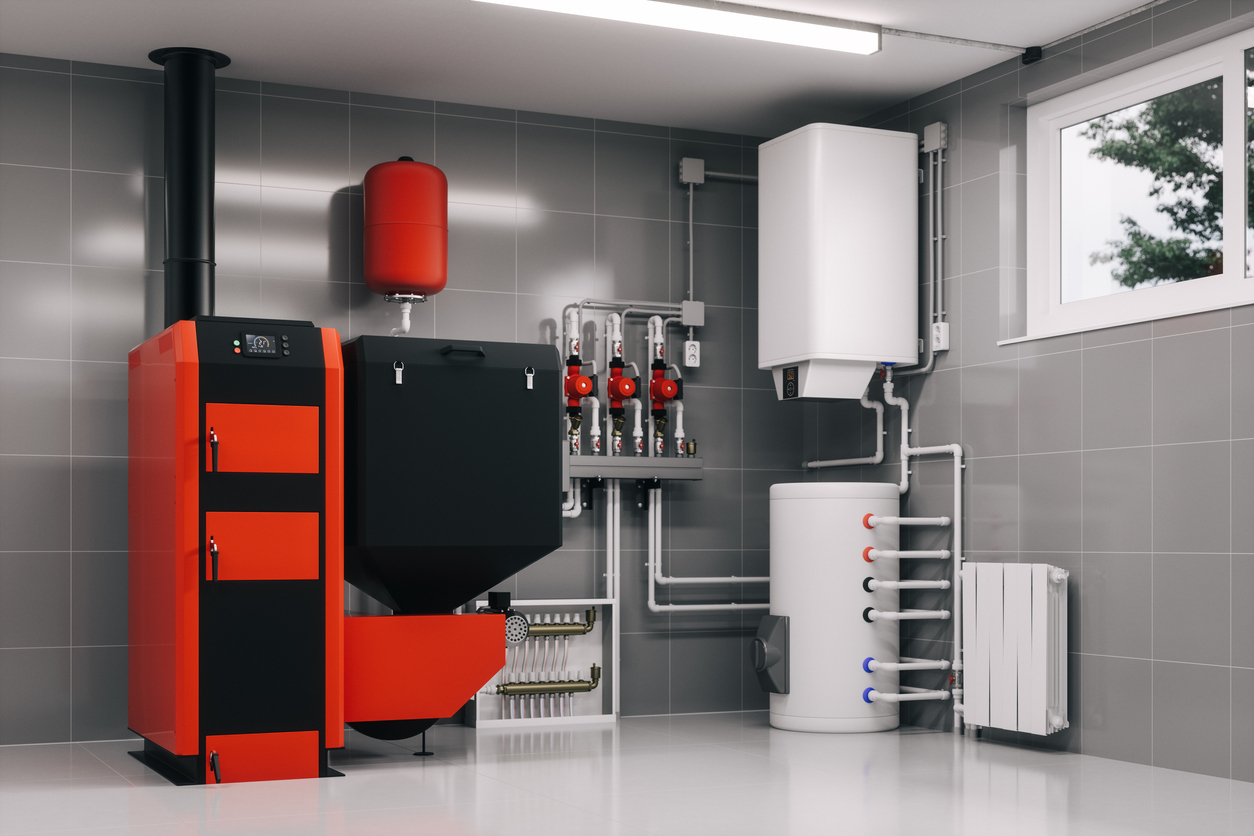
What to Consider When Choosing a Heat Pump Water Heater
In a nutshell, a heat pump hot water heater draws in air, extracts the latent heat from it, and uses that air to provide hot water. In fact, these units can extract a surprising amount of warmth even when it feels chilly outdoors. Since heat pump water heaters don’t directly use electricity or gas to heat the water, they use much less energy than even the best traditional water heaters. Keep reading to learn about the important factors to consider when choosing a heat pump water heater, such as size, performance, installation options, and noise level.
Size and First Hour Rating
The overall capacity of a water heater in gallons is one of the most important considerations in deciding its suitability for any given home and family. Manufacturers usually provide guidance, but it is based on averages. No two situations are alike, so users will want to consider their water usage.
A water heater’s FHR is how much hot water it can provide in an hour when starting with a tank full of hot water. This is particularly important at peak usage times when users don’t have time to wait. Keep in mind that the size of the tank is not necessarily an accurate predictor of FHR. For instance, several models we researched had an FHR higher than the actual tank capacity. In practical terms, this means the tank could be completely emptied and refilled in under an hour. This information should appear on the EnergyGuide label required by U.S. law for all water heaters.
Energy Efficiency
Heat pump water heaters can be significantly more energy efficient than traditional models, and thanks to U.S. government requirements, it’s possible to determine the actual efficiency of each model. Since 2017, all water heaters sold in the United States must indicate a UEF.
Several criteria, including actual capacity, energy consumption, and FHR, are used to calculate overall energy efficiency, and the higher the number, the better. Our research compared several traditional and heat pump water heaters: The traditional models were all lower than 1.0, whereas the heat pump water heaters were all higher than 3.0.
Installation and Noise
Pure heat pump water heaters need space around them from which to draw air, and this requirement impacts where users can install them. This may not be a problem for those looking for a commercial heat pump water heater, but many of these models aren’t recommended for closets, for example. The flip side is that if they can be installed in an open space near a furnace where there is a plentiful supply of warm air, they will use even less energy than normal. Heating and cooling expert Wortsmith agrees: “Heat pump water heaters work more efficiently in humid areas. The air contains more heat energy due to the presence of moisture. Heat pumps can extract this heat more easily and efficiently, leading to better performance.”
Split heat pump water heaters have indoor and outdoor units, so this type of installation is different, although there’s much greater flexibility when positioning the indoor unit. Hybrid heat pump water heaters can switch between heat pump and traditional operation. While this does make installation easier, the efficiency drops in traditional mode.
Heat pump water heater noise is typically minimal. They are usually very quiet—under 50 decibels—so they can often be installed near living rooms and bedrooms without disruption.
The Advantages of Owning a Heat Pump Water Heater
Although heat pump water heaters may seem like a fairly recent invention, the idea of heat exchange systems has been around for more than 100 years: Developing a heat pump for water heater use dates back to the 1930s. Potential buyers can be confident they are investing in well-proven technology. Here are the main advantages of owning a heat pump water heater:
- They can use free heat from the surrounding air or a nearby furnace, potentially saving hundreds of dollars per year.
- Reduced energy consumption means fewer greenhouse gases, so they are more environmentally friendly.
- Noise levels are low, so they can be installed near living rooms and bedrooms without disturbance.
- They are reliable and can last up to 25 percent longer than traditional water heaters when properly maintained.
- Tax incentives or rebates may be available depending on the geographic area.
FAQs
This guide contains a lot of useful information, much of it specific to particular models or buyer options. During our research, we found a few questions of a more general nature that crop up regularly. Read on to find the answers to these frequently asked questions.
Q. How does a heat pump water heater work?
A heat pump water heater works by extracting warmth from the outside air and using it to warm the water. According to Energy.gov, it operates much like a refrigerator but in reverse.
Q. Do heat pump water heaters work in cold climates?
Heat pump water heaters do work in cold climates, but some models are better than others. Pure heat pump water heaters function at their best when the temperature is above 40 degrees Fahrenheit. They will work below this temperature, but not as efficiently. Hybrid models can switch to electric operation if it gets too cold. Split heat pump water heaters that have an outdoor compressor continue to work at temperatures as low as -25 degrees Fahrenheit.
Q. What are the disadvantages of a heat pump water heater?
The main disadvantage of a heat pump water heater is often seen as the initial cost. However, according to government figures, models that meet Energy Star certification (and almost all do) offer considerable savings over time.
Another potential disadvantage is that some models require reasonable air space to operate most efficiently, so they aren’t always recommended for small homes. Additionally, they may heat water more slowly than some traditional electric water heaters.
